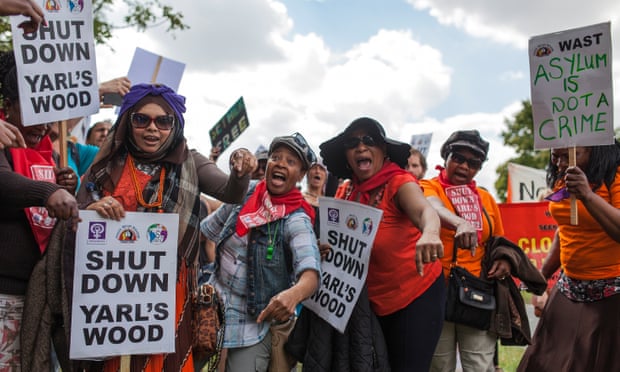
Ambulances are being called to detention centres in England 10 times a week, often for problems such as overdoses, suicide attempts, fainting and chest pain.
A Guardian investigation using freedom of information laws show emergency callouts have risen sharply compared with three years earlier despite a fall in population at detention centres.
The figures are likely to be an underestimate as the Guardian could only obtain data from those centres – about half of the total – that are large enough to have their own postcodes.
Detention centres were also visited because of hazardous chemicals, burns and explosions, psychiatric episodes, penetrating trauma and miscarriage.
In 2017, there were 522 ambulance visits to six centres, a rise of 43% from 365 in 2014. At the end of December 2017, there were 2,138 people held in the detention estate, a 38% fall compared with the 3,462 in 2014.
Experts put the rise down to the deteriorating state of detention centres, with little attention being paid to people’s wellbeing. They said an end to indefinite detention was long overdue.
Celia Clarke, the director of the charity Bail for Immigration Detainees, described the Guardian’s findings as “extremely shocking but not surprising”.
“Levels of suicide and self-harm are unacceptably high and we see people on a daily basis who are in need of care and should never be locked up. That they are with such little attention paid to their wellbeing,” she said.
The Labour MP David Lammy said the “abhorrent scale of this negligence” was the result of the Home Office’s ideological commitment to “dehumanise” a particular section of British society.
“We are still the only EU country which allows indefinite detention of migrants – and what this shows is our treatment of those detained is cruel, inhumane and detrimental to their health … We need to radically reform our immigration system in a way that is just and humane,” Lammy said.
Natasha Walter, the chair of Women for Refugee Women, focused specifically on Yarl’s Wood, said the high number of ambulance calls to the centre highlighted the vulnerability of detained women.
“We know from visiting and supporting women in Yarl’s Wood that women who have survived human rights abuses are routinely locked up … despite Home Office policy stating that they shouldn’t be there and even though they have physical and mental health problems which are exacerbated by the experience of detention,” Walter said.
“The government has promised to reduce the number of vulnerable people in detention. It now needs to act on this promise,” she added.
Figures show that over five years there were 131 calls for poisoning or overdoses, and 46 for psychiatric problems or suicide. The majority of calls (264) were for chest pains or cardiovascular problems.
Last month, the Guardian revealed a 22% rise in the number of people trying to kill themselves in detention. Suicide attempts have become more frequent in British deportation detention centres, with on average about two attempts every day this summer, according to a freedom of information request response passed to the Guardian.
Between April and June of this year there was a 22% rise in the number of detainees who tried to kill themselves. In all, 159 attempts were recorded, more than half of them in two sites near Heathrow, Colnbrook and Harmondsworth.
A Home Office spokesperson said: “We are committed to protecting the vulnerable and treating those in detention with dignity and respect. We demand the highest standards from those we entrust with the safety and welfare of people in detention.
“The law does not allow indefinite detention. Published statistics for 2018 show that two-thirds of those in detention were detained for less than 29 days.”
END

Be the first to comment